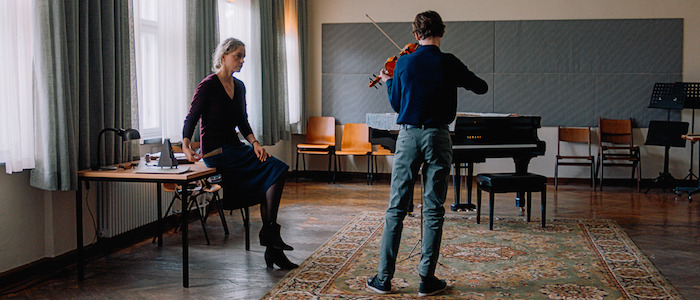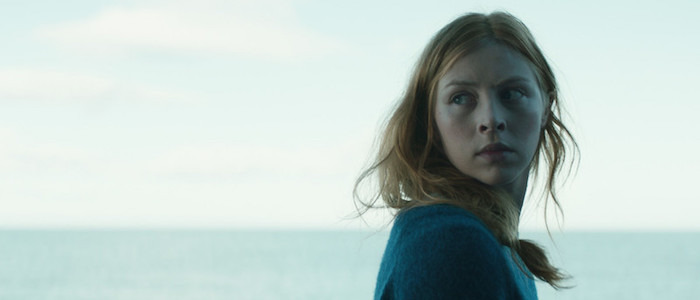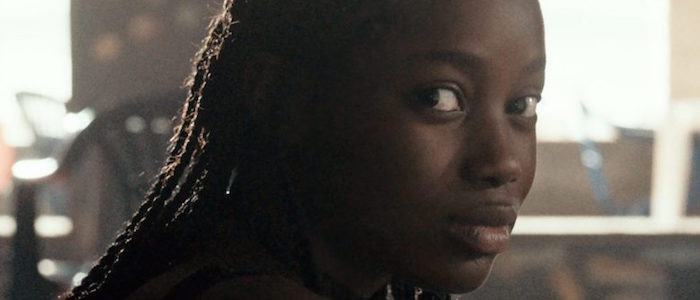"Now Is Our Time": How Global Female Directors At TIFF 2019 Subverted Everything
Like many time periods preceding it, the fall film festival circuit of 2019 has been a mixed bag of results for female filmmakers. The Venice Film Festival spared a measly two slots in its competition for films directed by women and, as if to thumb their nose at those decrying their regressive attitudes, awarded their Best Director prize to convicted rapist Roman Polanski. All this from a festival that signed the 50/50 by 2020 pledge for gender parity just last year, to boot. As Katrin Gebbe, director of Pelican Blood told me, "In the past few years, we've started to put our finger into the wound."
Meanwhile, at the 2019 Toronto International Film Festival (TIFF), the programmers paid more than lip service to their commitment on equality. Female directors comprised 36% of this year's selection at TIFF, with percentages even higher in sections like Contemporary World Cinema and the high-profile Galas. Look beyond the numbers, too, and it's clear that quantity did not come at the expense of quality.
Quotas for representation and diversity remain a touchy subject, as I learned from the three female directors who I interviewed during the festival. All expressed some degree of concern over the potential negative externalities, be it the blame of men or the potential to induce imposter syndrome. But they all agreed – festivals like TIFF taking a proactive approach to promoting female directors represents a good development overall. "It won't get better on its own," said Ina Weisse, director of the German film The Audition. "We have to work for it."
It's worth the work. Perhaps because institutional sexism allows fewer second chances to female directors, their films were sharper, more focused and featured a much clearer point of view. Twelve of the whopping 35 films I screened for TIFF were directed by women, and the ratio of hits to misses among them was better than that of their male counterparts. "Good for us, because that's what we need," Malgorzata Szumowska, the Polish director of The Other Lamb told me, "Female directors, but bringing high-quality films. Not only because it's a woman."
If there's any overarching takeaway from dipping my toe into the vast lineup of female-helmed films at TIFF, it was that practically all of them set out to expand traditional roles for women on screen. With the notable of exception of Marielle Heller's heavily male-centered A Beautiful Day in the Neighborhood, arguably the most high-profile female directed film of the festival (and my personal favorite film), most women behind the camera played off some familiar character or archetype – only to take it in some kind of surprising, subversive direction.
Not Your Average Mothers: The Audition, Pelican Blood, The Sleepwalkers and Proxima
Perhaps the most instructive works to examine as proof are The Audition and Pelican Blood, two German films starring Nina Hoss (a stalwart actress familiar to fans of Christian Petzold) who immerses herself in two different maternal roles. In the former, Hoss plays Anna, a stern violin teacher keen to impress her exacting work ethic on her pupils. She sees some results with a student who barely squeaked by in their audition process, albeit it requires her to channel a less explicitly abusive version of the tactics employed by J.K. Simmons' Fletcher from Whiplash. Anna's technique proves less successful with her own son Jonas, however, who resents how her icily passionate devotion to the craft of music prevents her from expressing affection.
To director (and uncredited writer) Ina Weisse, Anna represents a fighter above all else – and she divulged to me that the character she could just as easily written the role for a man. When asked if this was at all a reaction against the constraints of the idealized mother figure who might be discouraged from displaying such open pugnacity, Weisse demurred. "It's not negative – fighting is a good thing," she said. "To be a good mother, you have to fight with yourself." The Audition, to her, simply allows for the fuller representation of mothers beyond stereotypes. "Women can share who they are inside," Weisse explained, "and not just a picture."
Hoss' second feature at TIFF, Pelican Blood, casts her as a much more gracious figure. Her Wiebke maintains a steadfast devotion to her adopted daughter Raya despite increasing evidence that the child's troubled past is manifesting itself in her violent acts. "What connects me to the protagonist Wiebke is that I'm quite idealistic," offered writer/director Katrin Gebbe, who claims that her becoming a mother of her own while developing the film was pure coincidence. "I want to believe that somebody can be healed, especially a child who is traumatized. Every child is worth fighting for."
But the longer Pelican Blood goes on, the more it becomes clear that all Wiebke's kindness and patience might not solve the problem on its own. In order to save her family, she turns to some drastic measures to get help from outside the home. So is Wiebke giving up by capitulating to unorthodox strategies, or does her desire for additional help represent strength? "I just like to play with that," Gebbe suggested, "keep the movies open for different view angles and interpretations."
She was not alone among female filmmakers at TIFF to allow maternal figures access to a fuller range of emotions that includes potential acknowledgement of their own fallibility. In Argentine writer/director Paula Hernández's The Sleepwalkers, stressed out mother Luisa (Érica Rivas) spends the entire movie trying to connect with her daughter Ana. While she expresses her concerns about a predatory-seeming boy at their family estate, Luisa does not speak forcefully enough to prevent Ana from danger. Hernández leaves her grapple with that inaction in a stunning shot that allows Rivas to capture the many levels of anguish her character must confront.
Similarly, in French co-writer/director Alice Winocour's Proxima, Eva Green's astronaut Sarah must grapple with her feelings of failure as she's separated from her young daughter Stella during training. Try as she might to compartmentalize this estrangement, it begins to weigh on Sarah as she prepares for her upcoming mission to space. As her American counterpart tells her, "there's no such thing as a perfect mother," a phrase which Sarah embraces as she works not to quell her sadness but to instead embrace it. Her love for Stella makes for such an important part of her identity that she's willing to take the necessary risks in order to keep her persona intact – no matter the ire it draws from her professionally-minded colleagues.
"Motherhood as an ideal, it's really questionable," Gebbe cautioned, "because how far do you want a mother to go in this particular situation? Is this something a mother could carry on her own shoulders, or should society do something about this and support more?"
Tweaking Genres: The Other Lamb and Sea Fever
Two female filmmakers at TIFF worked explicitly to undermine genre expectations. Malgorzata Szumowska's The Other Lamb works within the framework of a cult film but skips much of the backstory surrounding the charismatic leader, his devoted followers or the shared principles that bind them together. As Szumowska explained, part of the rationale was trusting the audience that they could fill out the obvious (just like many cults, it's Stockholm syndrome that keeps them there) and part of it was her producers wanting a 90-minute movie. But reducing expository scenes to a bare minimum also allowed her to avoid clichés by leaning into a "visual, dreamy, symbolic" language, to use her words.
While The Other Lamb constitutes "a kind of manifest[o] against patriarchy" for Szumowska, the way in which she makes a movie for the moment might take viewers by surprise. The film's protagonist Sela (Raffey Cassidy) does undergo a kind of crisis of conscience as she comes of age and realizes that the cult leader "Shepherd" (Michiel Huisman) engages in patterns of abusive behavior. Yet her first instinct is not to run for the exits despite being presented the opportunity by a pariah in the group; as Szumowska put it, "she [Sela] couldn't follow her because she had a responsibility" to the other women.
Sela confronts her conflicted feelings about the cult, which defines her entire worldview and identity since she was born into it. Rather than clarity, she finds confusion. Her growing aversion to the Shepherd's practices also uncovers some of his allure, reflecting the ways in which her coming-of-age takes on a sexual as well as emotional dimension. "She feels attracted [to] him," Szumowska conceded, "and you see the process from sexual attraction and almost love is changed into something sick, brutal, abusive and violent."
Szumowska fearlessly portrays women who value power over freedom, even after Shepherd denies them both. The solution her film provides to toppling the patriarchy is not egalitarianism – it's erecting a matriarchy in its place. Without saying too much about the film's ending, Sela "starts to feel the power of the rage," as the director described, and follows it into unanticipated territory.
Speaking of uncharted waters in genre, Irish writer/director Neasa Hardiman's Sea Fever takes a fresh look at the creature feature and the "final girl" mythology. Hardiman's film sits perfectly at the intersection between Jaws and Alien – a mysterious, mutating beast terrorizes and takes the lives of a team of researchers on a boat. Young marine biology student Siobhán (Hermione Corfield) tries to warn her crew members of the dangers posed by this green creature causing problems on board, yet most do not care to heed her warnings until it's too late.
Hardiman's film clearly establishes Siobhán as the smartest and most prepared among the crew to outsmart and outlast the creature, even though she possesses fewer of the maritime skills needed to fit in among the group. Siobhán fulfills much of what constitutes the "final girl" in horror cinema, a distinguished figure from a crowd who boasts some feature (in this case, her smarts) that differentiates her from everyone else. Well ... she is until she isn't. Again, I will refrain from giving away too much third-act plot detail of Sea Fever, but Hardiman adds something to the discourse with her explosion of expectations. Where Siobhán departs from the typical trajectory redefines what a "final girl" can be, prioritizing sacrifice for the many over the superiority of the one.
Strength from Weakness: Atlantics and Antigone
Elsewhere at TIFF, global female filmmakers found startling ways to play with archetypes that often serve as a shorthand for the gender's weakness. French co-writer/director Mati Diop's Atlantics finds surprising depth and resolve from the essentially widowed character Ada (Mame Bineta Sane). While Ada marries a wealthy man in Senegal, her heart lies with the construction worker Souleiman (Ibrahima Traoré), who's left to emigrate from Dakar in a tattered dingy after a stingy foreman denies him pay.
She's haunted emotionally by the memory he's left behind, while others in town are haunted in a more literal sense. (In some markets, the film does bear the subtitle A Ghost Love Story, so this shouldn't give too much away.) But Souleiman's loss does not render Ada a damaged or ruined woman. Rather than finding a way through grief, she uses the circumstances to fuel her self-actualization. As Souleiman feels Ada in his death, she feels him in her life. The entire experience leaves Ada convinced, as she states, that she is the one "to whom the future belongs."
A little closer to home at TIFF, Canadian screenwriter/director Sophie Desrape upends expectations of female martyrdom in her modernization of Antigone. The titular heroine (played by Nahéma Ricci) takes the courage she has to disguise herself as her brother in order to save him from deportation. Try as she might to offer herself as a sacrificial lamb to the country's immigration system, she's forced to endure a bureaucratic nightmare that presents more time for her family to undercut her efforts and fulfill the myth's tragedy.
Antigone puts it all on the line to defend her family, jeopardizing her own stability and security to protect her brother Polynices' (Rawad El-Zein) citizenship. As a psychologist breaks down for her, the choice she makes is between "civic life or family," and Antigone unapologetically opts for the latter. Yet even as events take a downward turn for her, Desrape finds a strange bit of hope. While it represents little but cold comfort, Antigone becomes a symbol of defiance that online crowds rally behind – and inspires real-world resistance. While sacrifice might sting in isolation, Desrape's expanded gaze shows how choices can ripple outward and make unanticipated waves.
Finding a Voice: The Perfect Candidate, Lina from Lima and How to Build a Girl
The most conventional female-directed film, if one might call it that, I saw at TIFF was Haifaa al-Mansour's The Perfect Candidate. It's a classic underdog story of how a discounted female character, unhappy with her lot in life, challenges the very forces that keep her down. But quaint as the story might be, it's still one of enormous progress – after all, the film does take place in Saudi Arabia where women only just earned the right to drive last year.
The Perfect Candidate boasts a disarming earnestness as al-Mansour, the first female director in the history of the Kingdom, depicts a young Saudi doctor Maryam's (Mila Alzahrani) quest to gain election to the local council. She runs on a simple platform: pave the road leading to her small-town medical clinic so citizens have better access to healthcare. The entrenched incumbent does not represent her biggest obstacle; in fact, we barely see him until the end of the film.
More than anything, Maryam must run against institutional and internalized sexism. She must change hearts, minds and attitudes that she belongs in the space of elected office. Not because she's a woman – her campaign contains only the slightest hint of identity politics – but because she's qualified. While al-Mansour's message departs little from orthodoxy, it's clear when looking at the broader film landscape that many people still need to hear it. As Katrin Gebbe told me when I broached the subject of gender parity at film festivals, "I think there is a lot of work to do," her voice shifting into a noticeably different register as she communicated her frustration. But looking at a selection of female-directed films from TIFF, there is cause for hope that festivals are making progress. More than just token representation, the festival made space for more than just standard representations of feminism or female experience.
I was struck just thinking about how wide a spectrum there was even just among stories of women finding their voice. In María Paz González's Lina from Lima, a domestic worker in Chile (Magaly Solier's titular character) finds self-expression in fantasy musical numbers, allowing her the vibrant range of articulation denied to her in real life. At the opposite end of the spectrum, there was Coky Giedroyc's How to Build a Girl, which uses the trappings of a coming-of-age tale to show how its protagonist endures a parade of cynical male journalists to find her authentic writing voice – one based in sincerity and emotionality. Be it through formalism or narrative, female directors at TIFF found a way to make their journeys and stories heard.
"I think in 20 years there's going to be more female directors than male directors, when you look at the quality," suggested Szumowska. "Maybe because now is our time ... maybe that's our power."




